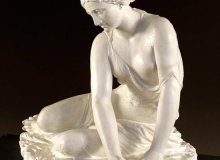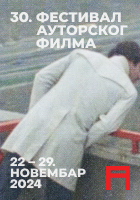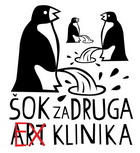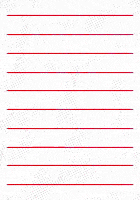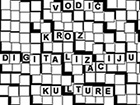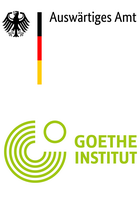Vadim Zakharov: History Teaches Us Nothing
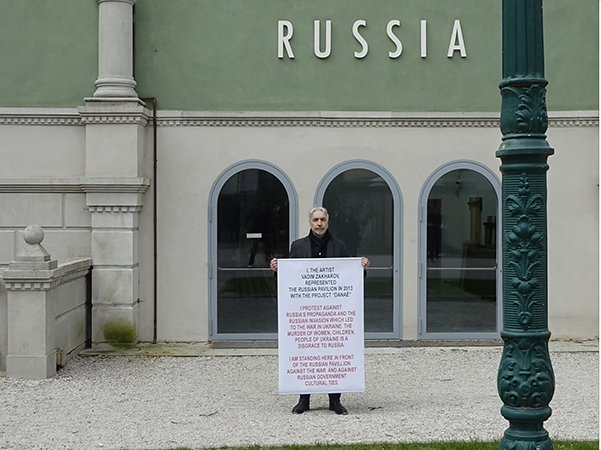
Vadim Zakharov, artist from Russia, who has been living and working in Berlin for years, strongly condemned the Russian invasion on Ukraine, which he publicly displayed by protesting in front of the Russian pavilion at the opening of the 59th Biennale in Venice. In an interview for the SEEcult.org, Zakharov speaks about the situation at the Russian cultural scene, the reasons why he believes all Russian official cultural events should be boycotted, and about other consequences of current politics rooted in the continuity of the KGB ruled system.
- You staged a protest against the war in Ukraine outside the Russian Pavilion at the Venice Biennale, which didn’t get opened also because of the protest of curators and artists against Russian invasion on Ukraine. What were the reactions to your action and their decision, besides several articles in international art media? Did anybody in Moscow react, having in mind that you represented Russia at the Biennale 2013?
Vadim Zakharov: I was on the Arts Council of the Russian Pavilion, and when the artists and the curator refused to participate in the exhibition, I supported them and left the Council with the following letter:
Dear members of the Arts Council of the Russian Pavilion in Venice,
I am fully supporting the decision of Alexandar, Kirill and Raimund. Hereby I announce that I am also resigning from the council due to Russia‘s war against the Ukraine. I cannot participate in any cultural events representing Russia in this difficult time. My country has broken all international laws, and as a Russian citizen I express my rejection against my country's aggressive policy by quitting the council.
Vadim Zakharov, artist
This is not an artistic action – this is my statement. In this case I am joining the artist's action as a citizen. Since I published photos of me standing with a poster in front of the Russian pavilion on Facebook, the reaction was mainly there. Most approved of my gesture, but there were a few strange comments. For example, artist Haim Sokol, whom I thought was a decent person, wrote: "Vadim, that's stupid!" I didn't even understand what exactly he meant - whether it was that I had written that this war was a disgrace to Russia, or that I was demanding a boycott of official Russian events. And there was complete silence in the official press! Fear and censorship had already kicked in!
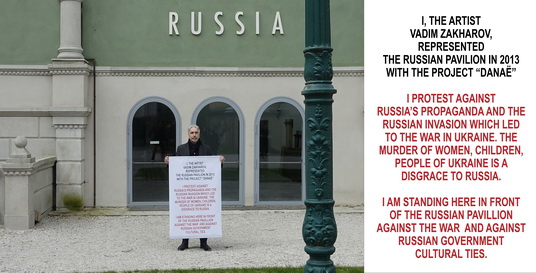
Vadim Zakharov in front of the Russian pavillion at the 59th Venice Biennale, 2022.
- You said later in a statement that “everyone must decide for themselves how to behave in relation to the war in Ukraine which began in 2014 and reached its bloody climax in 2022”. Did you expect before February that war would begin and do you think that it could be somehow prevented?
Vadim Zakharov: I never had any illusions about Putin's system, but even I did not expect a full-scale Russian aggression on Ukraine. I thought there would be a continuation of the local conflict already started in 2014. The war could have been averted if lustration had been carried out during perestroika, archives would have been opened and repentance for Leninist-Stalinist repression would have taken place. This means that I am not talking about the 20 years of Putin's rule, but about more than a century of Soviet Russia's history. What we have today is a continuation of the rule of the KGB system of suppressing the individual and educating the Russian people in a slave-like consciousness.
- You said that your protest in Venice is against the war and Russian Government cultural ties. What did you mean with the mention of cultural ties? What do they look like?
Vadim Zakharov: I am against any joint official events with Russia. Even if the Russian Museum or the Tretyakov Gallery or Pushkin Museums do exhibitions showing what seems to be the "good" art of the Russian avant-garde, French impressionists or something else. All such events legitimize Putin's Russia. So I understand when Ukrainians tear down monuments to Pushkin, Tolstoy etc in Ukraine. The Soviets have always been adept at using the classics to further their political goals, especially today. Let the Ukrainians themselves decide what monuments they need. Probably in 30 years they will restore the monument to Pushkin.
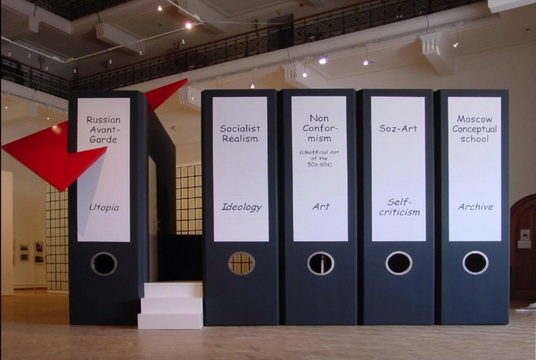
Vadim Zakharov, installation Scream... Scream... Sing! Bangkok biennale, 2022.
- Recently, at the opening of the 56th Belgrade International Theatre Festival, renowned Russian theatre critic and author Marina Davydova, who had to flee Moscow, said that Russia didn’t attack only Ukraine but also declared war on its own culture. She also called everyone to look at the current war in Europe through the prism of fine arts. Do you agree with Davydova and how do you see the situation in Russian culture now? How much did the war influence culture and art?
Vadim Zakharov: I absolutely agree with Marina Davydova. Russia's ruling circles have dealt a massive blow to its culture, and we are beginning to feel the consequences - plays are being canceled, directors' names are being erased from posters, concerts of performers who did not support the Russian war in Ukraine are being cancelled. And vice versa - I have personally banned my works from showing in Russian state-owned exhibition spaces. The scary thing is that many people in Russia don't understand what a disaster happened to Russian culture - they are still opening exhibitions, taking pictures with glasses of champagne at openings, when Russian bombs are killing hundreds of children and civilians in Ukraine. Some people object to this to me: "So what - should we give up all cultural life today?" Yes, exactly to give up. Yes, if you can't go out to demonstrate fear of violence and arrest, then at least be quiet, take a break, think about how to get out of this shit. We are going to have to deal with this disaster of Russian culture decades in the future.
- It is known that directors of some important cultural institutions in Russia have resigned since the war started, and that some museums decided to stop work on exhibitions – for example the Garage – where you exhibited in 2015… Are there any other manifestations against the war and current policy in the cultural institutions and on the independent cultural and art scene in Moscow and other main cities?
Vadim Zakharov: There is none of this. There is personal protest, which is instantly suppressed. And those who cannot protest are silent.
- Do you think that the global artistic community should be or could be louder in protest against war? To make calls for ceasefire and negotiations or to initiate dialogue on the current situation at least on an artistic, intellectual level? It is known that Ukrainian culture is receiving financial support from various sources, but it seems that all end up with that, just as EU/USA political support for Ukraine is mainly based on armaments… Why is the art world silent?
Vadim Zakharov: I don't think the global art community is silent. There is a lot going on in the West - cultural contacts with Russia in general are blocked. And Ukrainian artists, composers and directors are actively invited to Europe and America today. But it is even more important to defeat Putin's machine of suppression, and for that you need Western weapons, not concerts, exhibitions and empty talk, although this is also necessary.
- On the other side, Russian artists are not very desirable throughout Europe these days, there were even calls at the beginning of the war for a boycott of Dostoyevsky and other greats of Russian and world culture. What do you think about the cancel culture phenomenon and its consequences?
Vadim Zakharov: I think I've already answered!
- You have lived in Berlin since 2010, and long before you practically moved to Germany, but are you now in a sort of exile? We assumed that you wouldn’t be welcomed in Moscow these days? On other hand, is it difficult to be an artist of Russian origin in Western Europe now, although you and your art practice are well known internationally?
Vadim Zakharov: This is a difficult subject for a separate interview. I have never emigrated, I still have a Russian passport. I have never felt exiled. But now I am afraid to return to Moscow, and I don't want to. I should point out that there was internal emigration in Soviet Russia - I was an emigrant in my native country until the beginning of Perestroika. The problems of Russian contemporary art don't lie outside but inside, I think. It's something you have to think about for a long time. Thirty years after perestroika and hundreds of exhibitions in the West, we are not in demand. Compare us to Chinese artists, for example. You can see the difference immediately, and we started from the same platform.
- What do you think about the current position of dissidents from Russia who live abroad in general? Is there any animosity towards Russian artists who left their homeland in protest against the war and the regime among the EU governments and funding institutions?
Vadim Zakharov: The war is not over yet, we still do not know how far Russia will go in its insane aggression. So we do not know how negative the reaction will be in the future. Today I personally do not feel any hostility from the German government, on the contrary.
- Important part of your professional practice is work on archives. As one of the Moscow conceptualists, you assumed the role of chronicler of other artists in that circle, but also of the predecessors and successors - through documentation more than 230 their solo and group exhibitions that took place in Russia and abroad from 1989 to 2014. You presented that archive at the exhibition “Postscript after RIP” at the Garage in 2015, and in your manifesto for that show you said that you liberate yourself and others from the need to conceptualize and contextualize your work. “I abandon all theory that could frame it”. Do you think that conceptualization and contextualization of your work aren’t necessary or could be wrong?
Vadim Zakharov: What I meant was that art historians and critics like to label and shove artists' activities into previously laid out channels. My multi-faceted activities as an artist, archivist, publisher, collector and curator are difficult to describe in any way. One or two sides are taken and others are discarded. For example, my many collaborations from 1978 to 2016 are outside the interest of art historians, with the exception of the “SZ Group” (1980-1984, 1989). And for me, as a contemporary artist, this is a very important activity.
- As Boris Groys points out, you took on all the jobs offered by the art system (artist, curator, critic, designer, publisher, biographer, archivist, documentary filmmaker, historian, and interpreter) - to affirm your cultural autonomy. What is your position now in that context?
Vadim Zakharov: It's not about autonomy, but rather about stepping out of all the usual cultural frameworks. For example, from 2016 to 2020, my wife and I organized the FREEHOME project in my flat in Berlin. In almost four years, we held 17 exhibitions, 27 readings, performances and presentations. Importantly, it was not a local Russian venue. We exhibited in our private space more than 200 artists from all over the world, both young and old, very famous. This project was not commercial – we invested our own money in it. You can see all our activities on Facebook - type FREEHOME.
- How would this moment of civilization appear if it could be captured and preserved? Is it worth capturing? Did we learn anything from history?
Vadim Zakharov: The main thing is that we have learnt, or knew, but again have forgotten:
- History teaches us nothing!
- Propaganda is far more dangerous than bullets and bombs!
- Corruption is indestructible!
- People don't want the truth!
- Trust, Unity, Freedom and Love were engraved on the coins that were part of your installation at the Biennale in Venice, and you guaranteed with your honor the value of them. Could you say that these values still exist in the contemporary world?
Vadim Zakharov: In my previous answer, I noted the negative categories in our lives. But I can speak about the new, incredibly positive things that give a tiny bit of hope for the future. I am referring to the many volunteer initiatives that keep this ship called "life" from following the “Russian ship”!
- What motivates you now and could you say something about your further work?
Vadim Zakharov: Nothing motivates me today. Nothing at all, except my family and my remaining friends. Maybe I will be able to answer that question when the war is over.
*Photos: Vadim Zakharov, Alessandra Franetovich, Daniel Zakharov, courtesy of the artist
(SEEcult.org)
*Funded by the Stabilisation Fund for Culture and Education 2022 of the German Federal Foreign Office and the Goethe Institut

